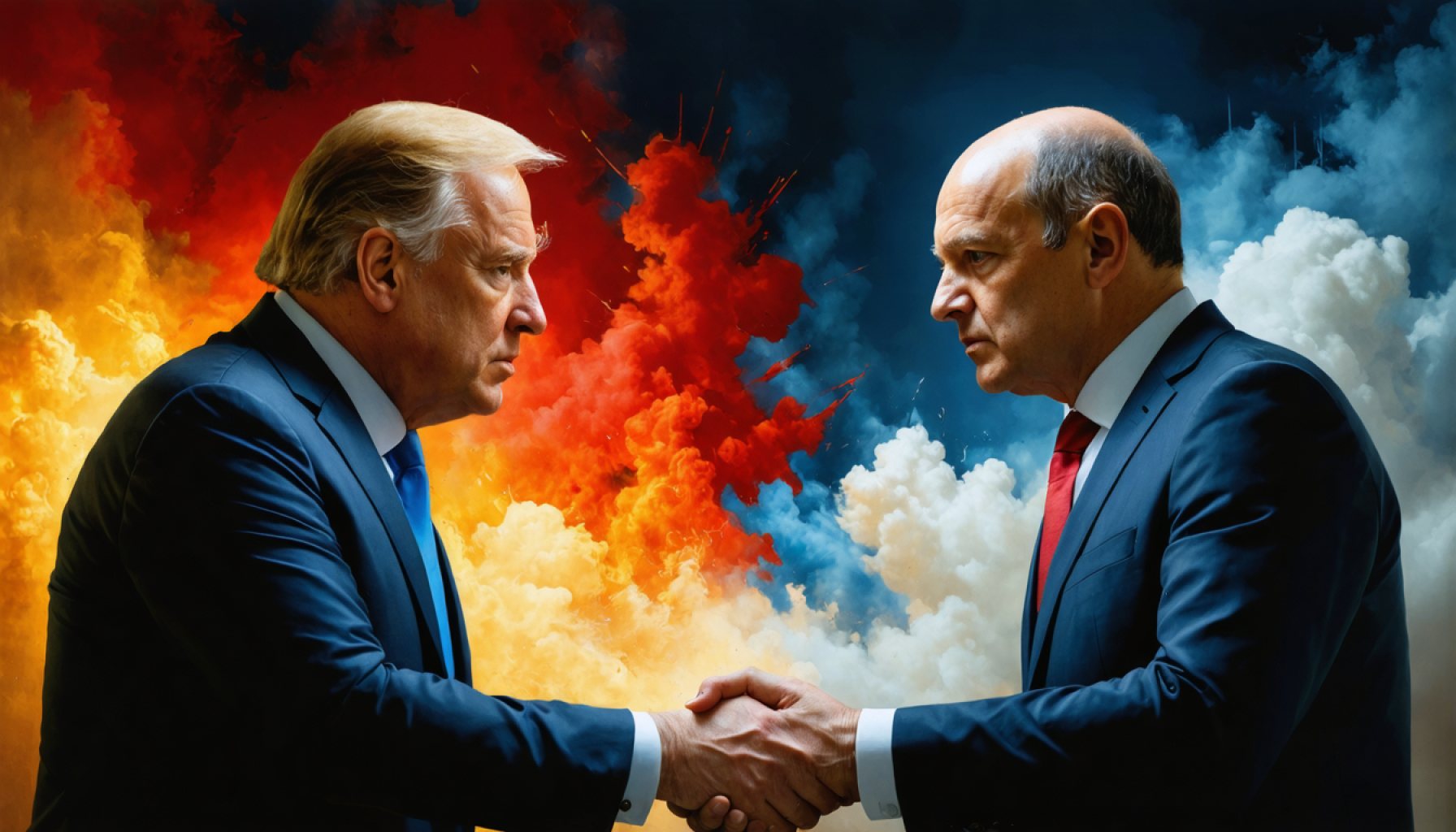- Germany faces a pivotal political moment with Friedrich Merz and Olaf Scholz competing for leadership.
- Merz seeks to project a statesmanlike image, balancing assertiveness with caution from past defeats.
- Scholz, once underestimated, gains attention through sharp rhetoric and draws on extensive political experience.
- A new documentary, Kanzler und Herausforderer – Scholz und Merz im Wahlkampf, offers insights into their campaigns and personal struggles.
- The German electorate anticipates the February 23 decision that could redefine leadership and the country’s direction.
Germany stands at a political crossroads, with two compelling figures vying for leadership: Friedrich Merz and Olaf Scholz. Like the calm before a storm, the air crackles with anticipation. On one side, Merz, the embodiment of precision and assertiveness, seeks to redefine himself, wrestling with his image of impulsivity to project statesmanlike control. On the other, Scholz sheds his stoic persona, wielding sharp words and defiant stances, drawing attention in unexpected ways.
As both men hit the campaign trail across the sprawling German landscape, their contrasting styles illuminate the electoral stage. Merz, eyes focused on retaining his poll advantage, navigates the political labyrinth with careful steps. Memories of past defeats clamor in the background, whispering caution. Meanwhile, Scholz, often dismissed as the least favored chancellor, draws on a wellspring of experience from his stints under Chancellor Merkel and as Hamburg’s mayor. His reflection in the mirror of public opinion inspires a cautious optimism and a flint of determination.
Kanzler und Herausforderer – Scholz und Merz im Wahlkampf, a new documentary, peels back the layers, offering a rare glimpse into their worlds. The camera follows their every move, from the high-stakes trust votes to the fervor of regional rallies. Conversations with allies reveal stories of strength, vulnerability, and the weight of expectations.
As the days inch toward February 23, the pivotal question lingers: Can Merz maintain his edge, or will the shifting tides see Scholz rewrite the narrative of his chancellorship? Germany watches, waits, and wonders what the future, under old or new leadership, holds. The stakes are high, and the clock is ticking.
Who Will Lead Germany? Inside the High-Stakes Political Arena
How-To Steps & Life Hacks: Navigating German Political Campaigns
1. Understand the Political Landscape: Familiarize yourself with Germany’s political parties, including the Christian Democratic Union (CDU) led by Friedrich Merz and the Social Democratic Party (SPD) with Olaf Scholz.
2. Engage with Media: Follow reputable news sources for the latest updates on the campaigns. Documentaries like Kanzler und Herausforderer – Scholz und Merz im Wahlkampf can provide deeper insights into the candidates’ strategies.
3. Participate in Discussions: Join forums or local political gatherings to discuss and debate perspectives. This can offer a clearer view of public sentiments.
4. Stay Updated on Polls: Regularly checking political polls can help gauge public opinion and potential election outcomes.
Real-World Use Cases: Learn from Germany’s Political System
– Education: Universities can analyze the strategies used by Scholz and Merz to teach political communication and public relations.
– Governance: Political advisors worldwide can study Germany’s model to better understand coalition governments and leadership transitions.
Market Forecasts & Industry Trends: Germany’s Political Future
The political climate in Germany is poised for potential shifts. As digitalization and sustainability become central themes, leadership might pivot policies to focus on green energy and technology innovation. The international market is closely watching Germany’s stance on EU collaborations and trade deals, which are likely to influence global economic trends.
Reviews & Comparisons: Merz vs. Scholz
– Merz: Known for his corporate background, Merz aims to bring economic expertise to the forefront. His leadership is seen as a revival of conservative values.
– Scholz: His calm and resilient approach, coupled with a focus on social justice, resonates with those seeking stability and continuity.
Controversies & Limitations
– Merz: Critics argue his corporate ties might influence political decisions, raising concerns about the prioritization of business interests.
– Scholz: While experienced, some question whether he can rejuvenate the SPD’s image and appeal beyond its traditional base.
Features, Specs & Pricing: Political Stakes
– Campaign Budgets: Funding and resource allocation remain vital, as candidates must efficiently spend on media, rallies, and advertising to maximize outreach.
– Policy Proposals: Tax reforms, climate policy, and economic recovery are central themes that both leaders use to differentiate their platforms.
Security & Sustainability
Both candidates emphasize cybersecurity, especially with the increasing role of digital platforms in campaigns. Sustainable policies are also pivotal, with Germany’s commitment to reduce carbon emissions and embrace renewable energy sources.
Insights & Predictions
As the election date approaches, expect debates to intensify on Germany’s role within the EU, immigration policies, and responses to global challenges. The outcome may set a precedent for future political landscapes across Europe.
Tutorials & Compatibility
– Voter Education Workshops: Facilitated by local communities to ensure voters understand platforms and key issues.
– Digital Voting Systems: Innovations in secure online voting could enhance accessibility and engagement in the electoral process.
Pros & Cons Overview
– Merz:
– Pros: Economic focus, corporate experience.
– Cons: Perceived lack of social policy focus, older voter appeal.
– Scholz:
– Pros: Experience in governance, social justice orientation.
– Cons: Challenges in energizing younger voters, need to broaden appeal.
Actionable Recommendations
– For Voters: Engage in fact-checking and review multiple sources to avoid misinformation.
– For Candidates: Leverage social media platforms to reach younger demographics more effectively.
For further information on Germany’s evolving political scene, visit Deutsche Welle.
